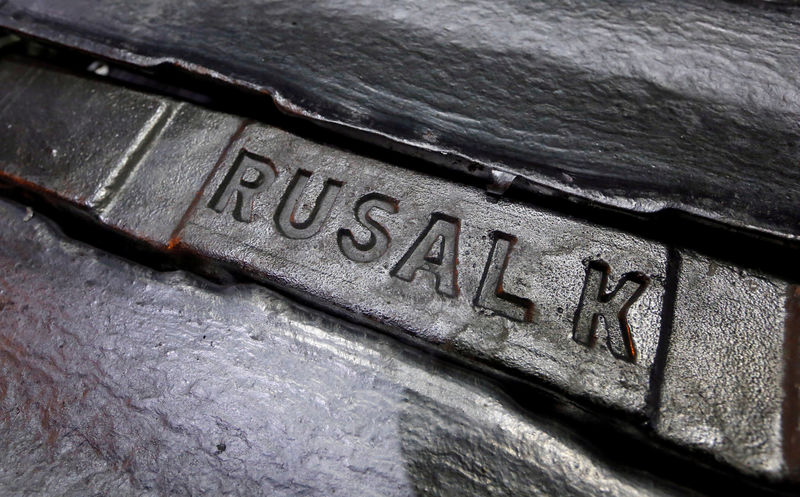By Eric Onstad and Polina Devitt
LONDON/MOSCOW (Reuters) - Russia's Rusal may be forced to divest most of its portfolio of overseas operations if the aluminium giant cannot restructure them to evade U.S. sanctions and ensure a flow of raw materials.
U.S. sanctions imposed against key allies of Russian President Putin have already started to cripple United Company Rusal's extensive string of international operations from Sweden to Guinea to Australia.
Rusal, the world's second biggest aluminium producer behind China Hongqiao Group Ltd, is heavily dependent on its international network of mines and refineries. These last year accounted for 53 percent of its output of raw material ore bauxite and 64 percent of production of semi-processed sister alumina.
"How does Rusal continue to fund its operations and produce metal if its raw material supply chain is broken?," said Robin Bhar, head of metals research at Societe Generale (PA:SOGN).
One key will be finding shipping and logistics firms willing to take the risk to transport those supplies, industry sources said.
Shipping giants Maersk Line and Mediterranean Shipping Company (MSC) both said they were halting any new trade with Russian entities targeted by U.S. sanctions.
"Like everywhere, it's greed and fear. At some point greed wins," said a industry source who declined to be named because he was not allowed to speak to the media.
"The bigger the company the more reluctant it will be, but smaller companies that can go under the radar may think the risks are worth it if they can get a really good price."
FORCE MAJEURE
Rio Tinto (LON:RIO), which supplies bauxite to some of Rusal's refineries and buys refined alumina, said it will declare force majeure on some contracts, showing the immediate impact on Rusal's supply chain.
Rio also said on Friday it was reviewing Rusal's 20 percent stake in the Queensland Alumina refinery.
Illustrating knock-on effects, French aluminium smelters in Dunkirk and St. Jean de Maurienne are scrambling to find alternative alumina supplies after being cut off from material from Rusal's Irish refinery, said Johan Vlietinck, CGT union official at the Dunkirk smelter.
Rio is selling the Dunkirk smelter to Britain's Liberty House while the other smelter is owned by Germany's Trimet.
Another crucial issue is funding since the U.S. sanctions prohibit Rusal from doing transactions in dollars.
The Russian government has pledged to provide Rusal with short-term liquidity and offer other assistance, but that help will mainly assist the domestic assets and may do scant good overseas.
"When it comes to Rusal's Russian operations, they should continue to operate without restriction... but the same is not true for the remainder of the portfolio, each one of which has its own set of unique problems," said senior analyst Anthony Everiss at consultancy CRU.
Many governments are working behind the scenes to keep Rusal operations running in their countries to safeguard jobs, but the easiest way to ensure this may be to transfer ownership, said Goldman Sachs (NYSE:GS).
"Rusal's international facilities are...under potential restructuring. The alumina and bauxite facilities...could therefore change hands," the bank said in a research report.
Restructuring asset ownership into non-sanctioned entities has precedents in Russia going back to Gunvor in 2014, it added.
GUINEA SUPPORTIVE
The authorities are supportive in Guinea, which accounts for more than a quarter of Rusal's bauxite output, and the mines are continuing to operate, according to industry sources in the country.
The main issue will be logistics and finding middlemen who do not have any links with the United States, an industry source said.
The Dian-Dian project, the world's largest bauxite deposit, was still on track to launch production by the end of April, a senior official with the project told Reuters.
With expected output of 3 million tonnes a year, it would nearly double Rusal's bauxite output in the country.
In Ireland, Rusal's biggest alumina refinery, Aughinish, is under threat because Rio Tinto, which provided bauxite for the plant, has declared force majeure.
The plant has enough bauxite to last to the end of June, local media reports said. The plant did not reply to emails seeking comment.

The Swedish Kubal aluminium smelter, the only metal producing operation outside of Russia, was still producing but had halted deliveries, a local newspaper said.